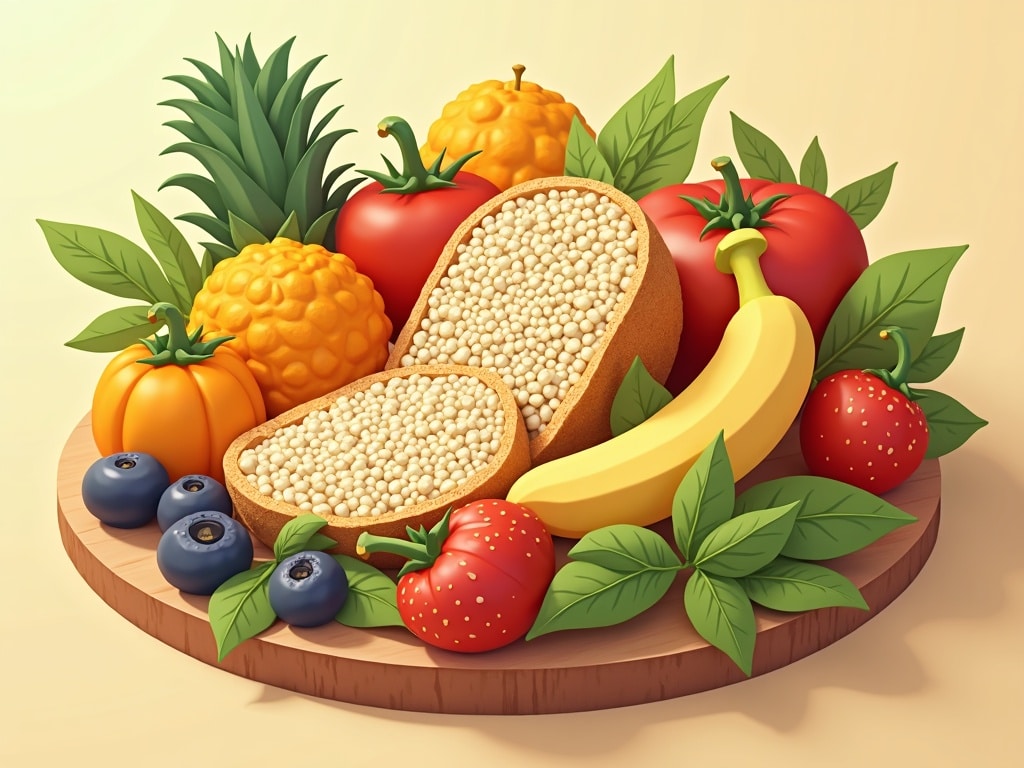The Unsung Hero of Weight Loss: Understanding the Role of Fiber
Imagine a simple, natural ingredient that could significantly impact your weight loss journey, improve your digestion, and boost your overall health. It's not a fancy supplement or a complicated diet trend. It’s fiber – the often-overlooked workhorse of a healthy diet. For years, fad diets have come and gone, but the importance of fiber has remained a constant, backed by science and real-world results. Let's delve into the profound role of fiber in weight management and how you can easily incorporate it into your daily life for lasting results.
What Exactly IS Fiber?
Fiber, also known as roughage or bulk, is a type of carbohydrate that your body can't digest. Unlike sugars and starches, which your body breaks down and absorbs, fiber passes relatively intact through your digestive system. This seemingly simple characteristic is the key to fiber's many health benefits, especially regarding weight management.
There are two main types of fiber: soluble and insoluble. Each plays a unique role in your body:
- Soluble Fiber: Dissolves in water, forming a gel-like substance in the digestive tract. This type of fiber can help lower blood sugar levels, reduce cholesterol, and promote feelings of fullness. Good sources include oats, beans, apples, citrus fruits, and psyllium.
- Insoluble Fiber: Doesn't dissolve in water and adds bulk to the stool, helping to move waste through the digestive system more quickly. This can prevent constipation and promote bowel regularity. Excellent sources include whole wheat, vegetables, and wheat bran.
While they function differently, both soluble and insoluble fiber are essential for a healthy diet and contribute significantly to weight management.
How Fiber Helps You Manage Your Weight
Fiber's role in weight management is multifaceted. It's not just one single mechanism at play; it's a combination of factors that work synergistically to help you achieve and maintain a healthy weight.
1. Promoting Satiety and Reducing Calorie Intake
This is arguably fiber's most impactful contribution to weight loss. Fiber-rich foods are naturally more filling than processed, low-fiber options. The bulkiness of fiber in your stomach sends signals to your brain that you're full, leading to reduced appetite and fewer calories consumed throughout the day.
Think about it this way: a bowl of refined white rice might leave you feeling hungry again within an hour or two. But a bowl of brown rice, packed with fiber, will keep you feeling satisfied for a significantly longer period. This difference translates to fewer snacks, smaller portion sizes at meals, and ultimately, fewer calories consumed.
2. Regulating Blood Sugar Levels
Soluble fiber, in particular, plays a vital role in stabilizing blood sugar levels. By slowing down the absorption of sugar into the bloodstream, it prevents those rapid spikes and crashes that can lead to cravings and overeating.
When blood sugar levels fluctuate wildly, your body releases insulin to try and bring them back into balance. These insulin spikes can promote fat storage, especially around the abdomen. By incorporating plenty of soluble fiber into your diet, you can maintain more stable blood sugar levels, reduce insulin spikes, and support healthy fat metabolism.
3. Supporting Healthy Digestion
Fiber, especially insoluble fiber, is crucial for maintaining a healthy digestive system. It adds bulk to the stool, preventing constipation and promoting regular bowel movements. This is important for overall health and can also impact weight management.
A healthy gut microbiome, supported by fiber, can influence metabolism and even affect appetite regulation. Some types of fiber act as prebiotics, feeding the beneficial bacteria in your gut. These bacteria produce short-chain fatty acids (SCFAs), which have been linked to improved insulin sensitivity, reduced inflammation, and even increased energy expenditure.
4. Reducing Calorie Absorption (Slightly)
While not a primary mechanism, fiber can also slightly reduce the number of calories your body absorbs from food. Because fiber isn't digestible, it can bind to some calories and prevent them from being absorbed in the small intestine. This effect is relatively small, but every little bit counts!
Debunking Fiber Myths
There are a few common misconceptions surrounding fiber. Let's address some of them:
- Myth: All fiber is the same. Reality: As mentioned earlier, there are different types of fiber (soluble and insoluble), each with unique benefits. It's important to consume a variety of fiber-rich foods to reap the full spectrum of advantages.
- Myth: You can get enough fiber from supplements alone. Reality: While fiber supplements can be helpful, they shouldn't be your primary source of fiber. Whole foods offer a broader range of nutrients, including vitamins, minerals, and antioxidants, that work synergistically with fiber to promote overall health.
- Myth: Eating too much fiber will cause digestive problems. Reality: Suddenly increasing your fiber intake dramatically can lead to gas, bloating, and discomfort. It's best to gradually increase your fiber consumption over time to allow your digestive system to adjust. Also, make sure to drink plenty of water, as fiber absorbs water and can cause constipation if you're dehydrated.
Understanding these nuances can help you maximize the benefits of fiber and avoid potential pitfalls.

Unlock the Secrets to Boosting Digestive Health for Enhanced Nutrient Absorption and Lasting Comfort
Top Fiber-Rich Foods to Incorporate Into Your Diet
Now that you understand the importance of fiber, let's explore some delicious and readily available foods you can add to your diet:
- Legumes: Beans, lentils, and peas are incredibly high in fiber and protein, making them a filling and nutritious addition to any meal.
- Fruits: Apples, bananas, berries, and pears are all excellent sources of fiber, especially when eaten with their skin.
- Vegetables: Broccoli, Brussels sprouts, carrots, and sweet potatoes are packed with fiber and other essential nutrients.
- Whole Grains: Oats, brown rice, quinoa, and whole-wheat bread are much higher in fiber than their refined counterparts.
- Nuts and Seeds: Almonds, chia seeds, flaxseeds, and walnuts provide a good source of fiber, healthy fats, and protein.
Simple Strategies for Increasing Your Fiber Intake
Making small, sustainable changes to your diet is the key to long-term success. Here are some practical tips for incorporating more fiber into your daily routine:
- Start Your Day with a High-Fiber Breakfast: Opt for oatmeal with berries and nuts, or a whole-grain toast with avocado.
- Snack Smart: Choose fruits, vegetables, or a handful of nuts instead of processed snacks.
- Swap Refined Grains for Whole Grains: Choose brown rice over white rice, whole-wheat bread over white bread, and whole-grain pasta over refined pasta.
- Add Beans to Your Meals: Include beans in soups, salads, or as a side dish.
- Read Food Labels: Pay attention to the fiber content of packaged foods and choose options with at least 3-5 grams of fiber per serving.
- Don't Peel Your Fruits and Vegetables (When Possible): The skin often contains a significant amount of fiber.
- Drink Plenty of Water: Fiber absorbs water, so it's essential to stay hydrated to prevent constipation.
It’s important to gradually increase your fiber intake over a few weeks to allow your digestive system time to adjust.
Fiber Supplements: Are They Right for You?
While whole foods should be your primary source of fiber, fiber supplements can be a convenient option if you're struggling to meet your daily requirements. Common types of fiber supplements include psyllium husk, methylcellulose, and inulin.
However, it's important to note that fiber supplements don't offer the same range of nutrients as whole foods. They also may not provide the same benefits for gut health, as they often lack the diverse types of fiber that feed a wide range of beneficial bacteria. If you're considering taking a fiber supplement, talk to your doctor or a registered dietitian to determine the right type and dosage for you.
The Takeaway: Embrace Fiber for a Healthier, Slimmer You
The role of fiber in weight management is undeniable. From promoting satiety and regulating blood sugar to supporting healthy digestion, fiber offers a multitude of benefits that can help you achieve and maintain a healthy weight. By incorporating plenty of fiber-rich foods into your diet and making gradual, sustainable changes to your eating habits, you can unlock the power of fiber and transform your health. So, start prioritizing fiber today and experience the difference it can make in your weight loss journey and overall well-being. Your body will thank you for it.

